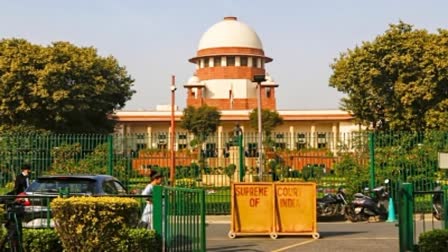The rights of the states on 'industrial liquor' cannot be taken away. Supreme Court.

New Delhi. The Supreme Court on Wednesday said 'industrial liquor' falls within the meaning of 'intoxicating liquor' under Entry 8 of List II (State List) of the Constitution and, therefore, states can regulate and tax it. [उत्तर प्रदेश राज्य और अन्य बनाम लालता प्रसाद वैश्य]The Supreme Court has given a decision which can increase the treasury of the states. The Supreme Court has ruled that states can impose tax on 'industrial liquor' and can also make laws on it. A bench of 9 judges of the apex court said that this is the right of the states and it cannot be taken away. It overturned the decision of a bench of 7 judges in 1990.
A nine-judge Constitution bench of Chief Justice (CJI) DY Chandrachud comprising Justices Hrishikesh Roy, Abhay S Oka, BV Nagarathna, JB Pardiwala, Manoj Mishra, Ujjal Bhuyan, Satish Chandra Sharma and Augustine George Masih delivered its verdict today. The majority of the bench ruled that the meaning of intoxicating liquor under Entry 8 of the State List goes beyond the narrow definition of alcoholic beverage or potable liquor and includes all types of liquor which may have an adverse effect on public health. Justice B.V. Nagarathna delivered a separate dissenting judgment.
The Court clarified, “Intoxicating liquor is used for consumption, but the inclusion of intoxicating liquor extends to its manufacture, etc. Intoxicating liquor is defined by the ingredient and 'intoxicating' is defined by the effect.” Thus, intoxicating liquor can be covered by the latter if the purpose of public interest is evident from the creation and development of the entry.”
The question before the bench was whether States can regulate industrial alcohol/denatured spirits through Entry 8, which confers powers on the State to deal with intoxicating liquors. On the other hand, Entry 52 of the Union List empowers the Central Government to powers to regulate industries which are declared by Parliament to be in the public interest. The Court acknowledged that there may be overlap between the two entries and the solution is to reconcile both the entries to see that there is no redundant Don't be.
The Court held that the legislative lists should be interpreted broadly. Therefore, it held that intoxicating liquor under Entry 8 cannot be limited to potable liquor. It held a 1990 case in Synthetics and Chemicals Ltd. v. State of Uttar Pradesh also rejected the ruling, which held that “intoxicating liquor” referred only to potable liquor and states could not tax industrial liquor.
The Court today held that the meaning of the phrase intoxicating liquor includes all liquor which is likely to be used to cause harm to public health and not merely potable liquor. The Court said, “Entry 8 of List II can be used to describe intoxicating liquor. Raw materials used in the production of alcohol cannot be excluded.” Actually, industrial alcohol is not meant for humans to drink. Actually, it is an impure form of ethanol used in industry. It is generally used as a solvent.
To prevent humans from accidentally drinking it, industrial alcohol is sold with a nauseating agent added to prevent anyone from drinking it. This type of alcohol is also known as denatured alcohol. Nonetheless, the Supreme Court ruled on industrial alcohol with an 8:1 majority. In this decision it was decided that industrial liquor could be classified in the sense of intoxicating liquor. States have the right to impose tax on intoxicating liquor under Entry 8 of List II.
The Supreme Court held that the powers of the State cannot be limited to taxing only alcoholic beverages. The excise duty imposed on potable liquor is a major component of the State's revenue. States often raise additional excise duty on liquor consumption to increase their income.
Tuesday's judgment also overruled a 1990 decision in the case of Synthetics and Chemicals Ltd vs State of Uttar Pradesh. That decision held that 'intoxicating liquor' meant only potable liquor and therefore states could not tax industrial liquor.
In a dissenting opinion, Justice Nagarathna said that 'industrial liquor' means liquor which is not fit for human consumption and artificial interpretation cannot be adopted to give a different meaning to the term 'intoxicating liquor' which is contrary to the intention of the Constitution makers. It is the opposite. The dissenting opinion also said that investigation should be conducted to find out whether the product causes intoxication in humans.
The decision comes after a hearing held on April 18, in which Attorney General R Venkataramani, Solicitor General Tushar Mehta and senior advocates Dinesh Dwivedi and Arvind P Datar, along with other state representatives, presented arguments representing the Uttar Pradesh government. The Court clarified that industrial liquor is not for human consumption, and distinguished it from intoxicating liquor under the Constitution.
Entry 8 in the State List under the 7th Schedule of the Constitution empowers the States to make laws on the manufacture, possession, transport, purchase and sale of intoxicating liquor, while Entry 52 of the Union List and Entry 33 of the Concurrent List mention those industries. Is. Parliament and state legislatures can make laws on subjects in the concurrent list, with the Supreme Court reaffirming that central laws take precedence over state laws.
In October 2007, the Supreme Court in the State of Uttar Pradesh vs. Lalta Prasad Vaish case noted that the 1990 judgment in the Synthetic and Chemicals case ignored the 1956 five-judge bench decision in the Chaudhary Tika Ramji vs. State of Uttar Pradesh case Thus, the case was referred to a nine-judge Constitution bench on December 8, 2010.

Comments are closed.